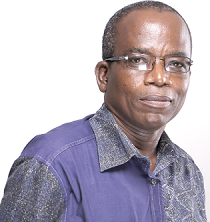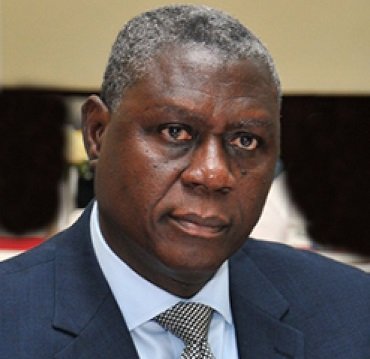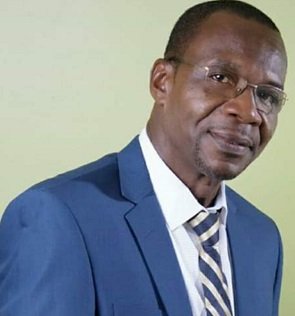Features
‘Peeping’ into the ‘thoughts’ of the Chief Justice

Just last week, the Chief Justice, Mr Kwasi Anin-Yeboah, made ‘landmark statements’ about the media in Accra.
Reportedly, he said : “The judiciary has no power or option of interfering with media freedom”, stressing that “Ghana must and will remain a bastion of freedom of speech.”
The caveat of the Chief Justice was, however; “we must urgently address the issues of standards and propriety in relation to court reporting, else we make ourselves vulnerable to misinformation that will mislead the citizenry.”
Chief Justice
GJA President
Justice Anin-Yeboah made these statements while inaugurating the Judicial Press Corps , besides launching a handbook for journalists on court reporting.
The Chief Justice added:”The media is not an enemy of the judiciary, rather the two entities are enjoined by the Constitution to fight for peace and development of Ghana.”
However, he cautioned media practitioners and other communicators to respect the sanctity of the law courts and assured that the courts will do their best to ensure the smooth operations of the media.
The fact of the matter is that none of the arms of government has any power or option , under our 4th Republican Constitution , to interfere with media freedom, free expression and freedom of speech.
Indeed, freedom of speech and expression is the lifeblood of any democracy. For instance, to debate and vote, to assemble and protest, to worship, to ensure Justice for all; all these rely upon unrestricted flow of speech and information.
Really, democracy is communication: people talking to one another about their common problems and forging a common destiny. And before people can govern themselves, they must be free to express themselves.
This column, however, whole-heartedly agrees with the Chief Justice that , “we must urgently address the issues of standards and propriety”, not only in relation to court reporting but also “high media standards” in all spheres of our media industry.
As modern societies grow in size and complexity, the arena for communication and public debate is increasingly dominated by the news media and this time round, the social media.
The news media in a democracy have a number of overlapping functions . One is to inform and educate.
A second function of the media is to serve as a watchdog over government and other powerful institutions in the society, including the judiciary.
By holding to a standard of independence, objectivity and fairness; however imperfectly, the news media can expose the truth behind claims of governments and hold public officials accountable for their actions.
If they choose, the media can also take a more active role in public debates. For instance, through editorials or investigative reporting, the media can campaign for specific policies or reforms that they feel should be enacted.
Analysts point to another important role of the media: “setting the agenda”. Since they cannot report everything, the news media choose which issues to report and which issues to ignore.
In effect, the news media decide what is news and what is not news. Such decisions, in turn, influence the public’s perception of what issues are most important.
Readers, not many people, including our Chief Justice, may argue that the news media always carry out their functions responsibly.
Many journalists, who are “messengers of news” , may also aspire to high standards of objectivity and fairness, but the fact of the matter is that, in some cases, news is inevitably filtered through the biases and sensibilities of individuals and the enterprises for which they work.
The reality on the ground is that, news can be sensational, superficial, intrusive, inaccurate and inflammatory.
And the question is: what should institutions of state do in cases where the news media or other organisations abuse freedom of speech; with information that in the opinion of the majority, is false, repugnant, irresponsible or simply, in bad taste?
It may seem a paradox but some advocates of free speech claim that the solution is not to devise laws that set arbitrary definition of responsibility or to license journalists, but to broaden the level of public discourse so that citizens can better sift through the chaff of misinformation and rhetoric to find the kernels of truth.
Indeed, the “supersonic change of the world” is revealing but in 1919 a distinguished Justice of the Supreme Court of the United States of America, Oliver Wendel Holmes stated: “The best test of truth is the power of the thought to get itself accepted in the competition of the market.”
An American essayist, E.B White, puts it this way:”The press in our free country is reliable and useful not because of its good character but because of its great diversity.
“As long as there are many owners, each persuing its own brand of truth, we the people, have the opportunity to arrive at the truth and dwell in the light.”
So, My Lord Chief Justice, as you rightly stated; the media is not an enemy of the judiciary, the two entities are enjoined by the Constitution to fight for peace and development of our country.
The only snag here, in my view, is that the seemingly ‘germinating’ social media ‘terrorism’ in the country should not ‘infuriate’ the judiciary to sew “terrorism gowns and wigs” to counterbalance the irresponsibility of the new phenomenon where fake news is on “unstoppable” ascendancy.
Contact email/ WhatsApp of author:
asmahfrankg@gmail.com (0505556179)
———END——-
Features
Traditional values an option for anti-corruption drive — (Part 1)
One of the issues we have been grappling with as a nation is corruption, and it has had such a devastating effect on our national development. I have been convinced that until morality becomes the foundation upon which our governance system is built, we can never go forward as a nation.
Our traditional practices, which have shaped our cultural beliefs, have always espoused values that have kept us along the straight and the narrow and have preserved our societies since ancient times.
These are values that frown on negative habits like stealing, cheating, greediness, selfishness, etc. Our grandparents have told us stories of societies where stealing was regarded as so shameful that offenders, when caught, have on a number of instances committed suicide.
In fact, my mother told me of a story where a man who was living in the same village as her mother (my grandmother), after having been caught stealing a neighbour’s cockerel, out of shame committed suicide on a mango tree. Those were the days that shameful acts were an abomination.
Tegare worship, a traditional spiritual worship during which the spirit possesses the Tegare Priest and begins to reveal secrets, was one of the means by which the society upheld African values in the days of my grandmother and the early childhood days of my mother.
Those were the days when the fear of being killed by Tegare prevented people from engaging in anti-social vices. These days, people sleeping with other people’s wives are not uncommon.
These wrongful behaviour was not countenanced at all by Tegare. One was likely going to lose his life on days that Tegare operates, and so unhealthy habits like coveting your neighbour’s wife was a taboo.
Stealing of other people’s farm produce, for instance, could mean certain death or incapacitation of the whole or part of the body in the full glare of everybody. People realised that there were consequences for wrongdoing, and this went a long way to motivate the society to adhere to right values.
Imagine a President being sworn into office and whoever administers the oath says, “Please say this after me: I, Mr. …., do solemnly swear by God, the spirits of my ancestors and the spirits ruling in Ghana, that should I engage in corrupt acts, may I and my family become crippled, may madness become entrenched in my family, may incurable sicknesses and diseases be my portion and that of my family, both immediate and extended.”
Can you imagine a situation where a few weeks afterwards the President goes to engage in corrupt acts and we hear of his sudden demise or incapacitation and confessing that he engaged in corrupt acts before passing or before the incapacitation—and the effect it will have on his successor? I believe we have to critically examine this option to curb corruption.
My grandmother gave me an eyewitness account of one such encounter where a woman died instantly after the Tegare Priest had revealed a wrong attitude she had displayed during the performance on one of the days scheduled for Tegare spirit manifestation.
According to her story, the Priest, after he had been possessed by the spirit, declared that for what the woman had done, he would not forgive her and that he would kill. Instantly, according to my grandmother, the lady fell down suddenly and she died—just like what happened to Ananias and his wife Sapphira in Acts Chapter 5.
NB: ‘CHANGE KOTOKA INTERNATIONAL AIRPORT TO KOFI BAAKO
By Laud Kissi-Mensah
Join our WhatsApp Channel now!
https://whatsapp.com/channel/0029VbBElzjInlqHhl1aTU27
Features
Emotional distortions:A lethal threat to mental health
Emotional distortions can indeed have a profound impact on an individual’s mental health and well-being. These distortions can lead to a range of negative consequences, including anxiety, depression, and impaired relationships.
Emotional surgery is a therapeutic approach that aims to address and heal emotional wounds, traumas, and blockages. This approach recognises that emotional pain can have a profound impact on an individual’s quality of life and seeks to provide a comprehensive and compassionate approach to healing.
How emotional surgery can help
Emotional surgery can help individuals:
Identify and challenge negative thought patterns: By becoming aware of emotional distortions, individuals can learn to challenge and reframe negative thoughts.
Develop greater emotional resilience: Emotional surgery can help individuals develop the skills and strategies needed to manage their emotions and respond to challenging situations.
Improve relationships: By addressing emotional wounds and promoting emotional well-being, individuals can develop more positive and healthy relationships with others.
The benefits of emotional surgery
The benefits of emotional surgery can include:
Improved mental health outcomes: Emotional surgery can help individuals reduce symptoms of anxiety and depression.
Enhanced relationships: Emotional surgery can help individuals develop more positive and healthy relationships with others.
Increased self-awareness: Emotional surgery can help individuals develop a deeper understanding of themselves and their emotions.
A path towards healing
Emotional surgery offers a promising approach to addressing emotional distortions and promoting emotional well-being. By acknowledging the impact of emotional pain and seeking to provide a comprehensive and compassionate approach to healing, individuals can take the first step towards recovery and improved mental health.
Join our WhatsApp Channel now!
https://whatsapp.com/channel/0029VbBElzjInlqHhl1aTU27
BY ROBERT EKOW GRIMMOND-THOMPSON






